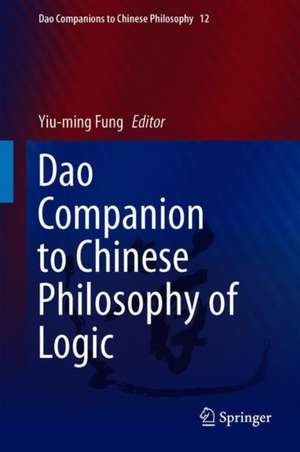Dao Companion to Chinese Philosophy of Logic: Dao Companions to Chinese Philosophy, cartea 12
Editat de Yiu-ming Fungen Limba Engleză Hardback – 11 iun 2020
Din seria Dao Companions to Chinese Philosophy
- 18%
 Preț: 1827.00 lei
Preț: 1827.00 lei - 18%
 Preț: 954.93 lei
Preț: 954.93 lei - 18%
 Preț: 1011.77 lei
Preț: 1011.77 lei - 18%
 Preț: 1033.23 lei
Preț: 1033.23 lei - 18%
 Preț: 956.03 lei
Preț: 956.03 lei - 18%
 Preț: 1131.40 lei
Preț: 1131.40 lei - 18%
 Preț: 969.93 lei
Preț: 969.93 lei - 24%
 Preț: 688.85 lei
Preț: 688.85 lei - 18%
 Preț: 807.96 lei
Preț: 807.96 lei - 18%
 Preț: 1242.35 lei
Preț: 1242.35 lei - 24%
 Preț: 784.82 lei
Preț: 784.82 lei - 18%
 Preț: 1119.56 lei
Preț: 1119.56 lei - 18%
 Preț: 954.45 lei
Preț: 954.45 lei - 15%
 Preț: 653.98 lei
Preț: 653.98 lei - 24%
 Preț: 1573.95 lei
Preț: 1573.95 lei - 18%
 Preț: 1128.08 lei
Preț: 1128.08 lei - 18%
 Preț: 1408.71 lei
Preț: 1408.71 lei - 18%
 Preț: 1121.62 lei
Preț: 1121.62 lei
Preț: 1127.15 lei
Preț vechi: 1374.58 lei
-18% Nou
Puncte Express: 1691
Preț estimativ în valută:
215.68€ • 225.76$ • 179.51£
215.68€ • 225.76$ • 179.51£
Carte tipărită la comandă
Livrare economică 31 martie-14 aprilie
Preluare comenzi: 021 569.72.76
Specificații
ISBN-13: 9783030290313
ISBN-10: 303029031X
Ilustrații: XII, 556 p. 17 illus.
Dimensiuni: 155 x 235 mm
Greutate: 0.97 kg
Ediția:1st ed. 2020
Editura: Springer International Publishing
Colecția Springer
Seria Dao Companions to Chinese Philosophy
Locul publicării:Cham, Switzerland
ISBN-10: 303029031X
Ilustrații: XII, 556 p. 17 illus.
Dimensiuni: 155 x 235 mm
Greutate: 0.97 kg
Ediția:1st ed. 2020
Editura: Springer International Publishing
Colecția Springer
Seria Dao Companions to Chinese Philosophy
Locul publicării:Cham, Switzerland
Cuprins
Introduction Part I: Concepts in Chinese Philosophy of Logic.- Chapter 1: Names.- Chapter 2: Naming and Reference.- Chapter 3: Sentences and Propositional Attitudes.- Chapter 4: Sameness and Difference.- Chapter 5: Reason/Cause and Principle.- Chapter 6: Classes and Individuals.- Chapter 7: Modalities and Quantifiers.- Chapter 8: Truth.- Chapter 9: Contradiction.- Chapter 10: Analogy .-Chapter 11: Reasoning.- Chapter 12: Argumentation.- Chapter 13: Language and Meaning/Intention.- Chapter 14: Definitions (Operative Concepts).- Chapter 15: Counter-factual Conditionals (Operative Concepts).- Part II: Issues and Theories in Chinese Philosophy of Logic.- Chapter 16: Logical Thought in Mohism and Later Mohism.- Chapter 17: Logical Thinking in the Gongsun Longzi .-Chapter 18: Paradoxes in the School of Names.- Chapter 19: The Rectification of Names in Confucianism.- Chapter 20: Metaphorical and Analogical Thinking in the Mencius.- Chapter 21: Problems of Language andLogic in Daoism.- Chapter 22: Paradoxical Language in Zen.- Chapter 23: Buddhism.- Part III: Logical Thought Transplanted from India and the West.- Chapter 24: Yin-ming in Chinese Buddhism.- Chapter 25: Aristotle in (Pre-modern) China.- Chapter 26: Logic and re-discovering Logic in Modern China.- Part IV: Logical Studies.- Chapter 27: Logical Studies in Contemporary Mainland China.- Chapter 28: Logical Studies in Contemporary Taiwan.- Index.
Recenzii
“The volume deals with aspects of the philosophy of logic, philosophical logic, and philosophy of language from the beginnings of Chinese philosophy until today. It thereby serves as a reference tool for queries into the subject matter … . chapters are original, well-argued, and well written. … The volume is a stimulating contribution to the study of Chinese thought.” (Barbara Hendrischke, Religious Studies Review, Vol. 46 (4), December, 2020)
Notă biografică
Yiu-ming Fung was a chair professor of the Division of Humanities at the Hong Kong University of Science and Technology and is currently a visiting professor of the Department of Philosophy at Taiwan Tunghai University. He is an analytic philosopher with special interest in Chinese philosophy, including Confucianism, Buddhism and Chinese Logic, and comparative philosophy.
Textul de pe ultima copertă
This book is a companion to logical thought and logical thinking in China with a comparative and interdisciplinary perspective. It introduces the basic ideas and theories of Chinese thought in a comprehensive and analytical way. It covers thoughts in ancient, pre-modern and modern China from a historical point of view. It deals with topics in logical (including logico-philosophical) concepts and theories rooted in China, Indian and Western Logic transplanted to China, and the development of logical studies in contemporary China and other Chinese communities. The term “philosophy of logic” or “logico-philosophical thought” is used in this book to represent “logical thought” in a broad sense which includes thinking on logical concepts, modes of reasoning, and linguistic ideas related to logic and philosophical logic. Unique in its approach, the book uses Western logical theories and philosophy of language, Chinese philology, and history of ideas to deal with the basic ideas and majorproblems in logical thought and logical thinking in China. In doing so, it advances the understanding of the lost tradition in Chinese philosophical studies.
Caracteristici
Is the first guided book for comparative studies in Chinese logic. Promotes the recovering and re-discovery of the lost tradition of Chinese logic Helps scholars in the West to understand the analytic aspect of Chinese philosophical tradition Brings together a group of top scholars in the field
